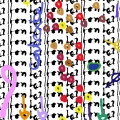Shared leadership in management teams

What if the traditional leadership model were actually counterproductive? Many suggestions on reinforcing the performance of your management team.
Many executives are disappointed with the way their management teams operate. Why do people stick primarily to their own domain of responsibility? Why are important decisions so often made privately, with no opportunity for true discussion?
• Management teams often operate according to the principals of heroic leadership.
In most management teams, only the leader is responsible for the overall result, akin to traditional “heroes.” Although subordinates may occasionally participate in decisions, they are responsible only for their respective domains.
• Heroic leadership is counterproductive.
Heroic leadership effectively feeds a vicious circle in which the leader, to ensure smooth coordination, has no choice other than to intervene with his or her subordinates. As a result, the latter feel even less empowered to deal with wider company issues.
• Management teams must move toward real shared leadership.
In this new operational model, the entire management team shares joint responsibility for overall results. This model is supported by three pillars:
– A sense of shared responsibility;
– A shared vision of the desired goals and direction;
– Mutual influence among team members.
SubscriberSign in
to download
the synopse (8 p.)
VisitorI want to buy
this synopsis (8 p.)
VisitorI want
to subscribe


